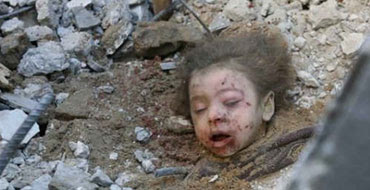Sunday, December 27, 2009
Tuesday, December 15, 2009
WANTED

Senior officials in Israel confirmed reports on Monday that a British court issued an arrest warrant against opposition chairwoman Tzipi Livni for her role in orchestrating Israel's military offensive against Hamas in the Gaza Strip nearly a year ago.
The request for the warrant was submitted by a pro-Palestinian organization.
British sources reported late Monday that though a British court had issued an arrest warrant for Livni over war crimes allegedly committed in Gaza while she served as foreign minister, it annulled it upon discovering she was not in the U.K.
Livni served as foreign minister alongside Prime Minister Ehud Olmert and Defense Minister Ehud Barak during the Israel Defense Forces offensive in Gaza. The three figures comprised the "troika" of top decision-makers who charted the course of the war.
Earlier Monday, Arab-language media reported that Livni canceled her participation in a Jewish function in London after a warrant for her arrest was issued over part in last winter's Israel's Gaza offensive.
Israel's ambassador to London, Ron Prosor, conferred with officials in the British Ministry of Justice who told him that they were unaware of any criminal complaint or arrest warrant against the former foreign minister.
Yet, further inquiries by Israeli officials revealed that a warrant had indeed been issued.
Al-Quds Al-Arabi claimed on Monday that Scotland Yard advised the organizers of the Jewish National Fund conference in northwest London that the former foreign minister had canceled her scheduled address to the assembly over threats of a possible lawsuit by pro-Palestinian groups.
The Al-Quds Al-Arabi report also said that a group of about 100 anti-Israel protesters rallied outside the Hendon Hall Hotel on Sunday, just as delegates arrived at the JNF meet.
Livni's office said in a statement following the report that her appearance at the London event was canceled two weeks ago due to a scheduling conflict.
Livni's office also said that the opposition leader was proud of all the decisions she made as foreign minister during the Gaza war, an operation which she said achieved its goal of bring security to Israel.
A United Kingdom court two months ago deferred until further notice an appeal by local pro-Palestinian groups to issue an arrest warrant against Barak, who was visiting the country at the time.
A similar appeal was issued in 2004 against Israel's then defense minister, Shaul Mofaz. At the time, Mofaz was granted immunity from international arrest and trial - a precedent set by the British court, which until then had given such protection only to foreign ministers or premiers
http://www.haaretz.com/hasen/spages/1134978.html
Saturday, December 5, 2009
Ukraine academic: Israel imported 25,000 kids for their organs
The claim, which was made by a Ukrainian philosophy professor and author at a pseudo-academic conference in Kiev five days ago, is the latest expression of a wave of anti-Semitism in the country. It comes a few months after a Swedish tabloid ran an article alleging that Israel Defense Forces soldiers have killed Palestinian civilians for their organs.
Jews, Israel and anti-Semitism have become a major motif of the presidential election campaign in Ukraine, with some figures making anti-Semitic statements and others condemning them. Some candidates, including a Jew and someone whose rivals claim is Jewish, blame a third rival - Prime Minister Yulia Tymoshenko - for bringing anti-Semitism into the race.
"Ukraine's political system is a parody of democracy," Russia's Chief Rabbi, Berel Lazar, said.
Vyacheslav Gudin told the estimated 300 attendees of the Kiev conference a detailed story about a Ukrainian man's fruitless search for 15 children who had been adopted in Israel. The children, Gudin said, had clearly been taken by Israeli medical centers, where they were used for "spare parts." Gudin said it was essential that all Ukrainians be made aware of the genocide Israel was perpetrating.
The conference, some of whose participants belong to a Slavic-rights movement, also featured two professors who presented a book blaming "the Zionists" for the Ukrainian famine of the 1930s as well as the country's current condition.
Many Ukrainian Web sites covered the speeches without putting them into context. In response to a request by the country's Jewish community Ukraine's police force is investigating ZUBR, one of the Web sites that reported the speeches.
Meanwhile, Ukrainians demonstrated outside the Israeli Embassy in Kiev on Tuesday to protest a letter signed by 26 Knesset members condemning what they described as anti-Semitic remarks by presidential candidate Sergey Ratushnyak. Protesters chanted "Ukraine isn't the Gaza Strip," indicating they consider the MKs to be trying to exert control over their country.
The letter, sent to Ukrainian leaders last month, articulated fear of a new "wave of anti-Semitism in the Ukraine that has come to a peak with the authorization of Ratushnyak, the current mayor of Uzhgorod, to run for president." In his mayoral campaign Ratushnyak blamed the Holocaust on the Jews, saying they stole German property, and warned of the same thing happening in Ukraine.
Although the protesters did not describe themselves as Ratushnyak supporters, photographs of the demonstration were posted on the candidate's Web site shortly after the protest.
Haaretz
Sunday, November 29, 2009
Saturday, November 21, 2009
Saturday, November 14, 2009
Kill Enemy Children: Jewish Edict | Sabbah Report
Hundreds of children were killed in Israel's war on Gaza earlier this year.
By Khalid Amayreh* | Sabbah Report | www.sabbah.biz
He argues that Goyem (a derogatory epithet for non-Jews) may be killed if they threaten Israel.
"If we kill a Gentile who has sinned or has violated one of the seven commandments - because we care about the commandments - there is nothing wrong with the murder."
Shapiro, who heads a small Talmudic school at the settlement of Yitzhar near Nablus, claims his edict "is fully justified by the Torah and the Talmud."
The anti-goyem edict seems to come in response to the arrest by Israeli police of a Jewish terrorist who has confessed to having murdered two Palestinian shepherds in the West Bank.
The terrorist, an American-born immigrant named Yaakov Teitel, also confessed to have tried to assassinate leftist Jewish figures.
Police considered the arrest an important achievement in combating Jewish terrorism, which experts contend thrives on religious edicts issued by rabbis affiliated with the religious-Zionist camp.
Nearly 16 years ago, a Jewish terrorist named Yigal Amir assassinated then Israeli Premier Yitzhak Rabin.
Moreover, numerous innocent Palestinians have also been murdered in cold blood by Jewish terrorists.
In 1994, Baruch Goldstein, a notorious Jewish terrorist, murdered 29 Muslim worshipers inside Al-Ibrahimi Mosque in the West Bank town of al-Khalil.
Non-Humans
The controversial edict is backed by numerous rabbis affiliated with the so-called national-religious camp as well as the Talmudic seminary in West Jerusalem, known as Merkaz Ha'rav.
Among the rabbis who have publicly supported the edict are Yitzhak Ginsburg and Ya'akov Yosef.
Ginsburg had written a leaflet glorifying murderer Goldstein and called him a "saintly figure."
Shapiro's views on how Palestinians and non-Jews in general ought to be treated according to Jewish religious law (halacha) are widely looked at as representing the mainstream not the exception in Israel.
During the Israeli onslaught against Gaza earlier this year, Mordecahi Elyahu, one of the leading rabbinic figures in Israel, urged the army not to refrain from killing enemy children in order to save the lives of Israeli soldiers.
He had even petitioned the Israeli government to carry out a series of carpet bombing of Palestinian population centers in Gaza.
"If they don't stop after we kill 100, then we must kill a thousand. And if they do not stop after we kill a thousand, then we must kill 10,000. If they still don't stop, we must kill 100,000, even a million. Whatever it takes to stop them."
According to Israel Shahak, author of "Jewish History, Jewish Religion: the Weight of Three Thousand years," the term "human beings" in Jewish law refers solely to Jews.
Many Jewish orthodox rabbis, especially within the national-religious sector, view international conventions incriminating the deliberate killing of civilians and destruction of civilian homes and property as representing "Christian morals" not binding on Jews.
In 2006, the Rabbinic Council of Jewish Settlements in the West Bank urged the army to ignore Christian morals and exterminate the enemy in the north (Lebanon) and the south (Gaza Strip).
Such manifestly racist and hateful edicts don't raise many eyebrows in Israel, neither among the intelligentsia nor in the society at large.
* Khalid Amayreh a journalist based in the Occupied Palestinian town of Dura.
Thursday, November 12, 2009
Wednesday, November 4, 2009
Wednesday, October 7, 2009
Sunday, October 4, 2009
Thursday, October 1, 2009
Friday, July 17, 2009
Monday, June 29, 2009
Gaza: 1.5 million people trapped in despair
Six months after Israel launched its three-week military operation in Gaza on 27 December 2008, Gazans still cannot rebuild their lives. Most people struggle to make ends meet. Seriously ill patients face difficulty obtaining the treatment they need. Many children suffer from deep psychological problems. Civilians whose homes and belongings were destroyed during the conflict are unable to recover.
During the 22 days of the Israeli military operation, nowhere in Gaza was safe for civilians. Hospitals were overwhelmed with casualties, including small children, women and elderly people. Medical personnel showed incredible courage and determination, working around the clock to save lives in extremely difficult circumstances. Meanwhile, daily rocket attacks launched from Gaza put thousands of residents at risk in southern Israel. Medical workers in Israel provided care for the traumatized population and treated and evacuated casualties.
This small coastal strip is cut off from the outside world. Even before the latest hostilities, drastic restrictions on the movement of people and goods imposed by the Israeli authorities, particularly since October 2007, had led to worsening poverty, rising unemployment and deteriorating public services such as health care, water and sanitation. Insufficient cooperation between the Palestinian Authority in Ramallah and the Hamas administration in Gaza had also hit the provision of essential services. As a result, the people of Gaza were already experiencing a major crisis affecting all aspects of daily life when hostilities intensified in late December.
Six months later, restrictions on imports are making it impossible for Gazans to rebuild their lives. The quantities of goods now entering Gaza fall well short of what is required to meet the population's needs. In May 2009, only 2,662 truckloads of goods entered Gaza from Israel, a decrease of almost 80 per cent compared to the 11,392 truckloads allowed in during April 2007, before Hamas took over the territory.
Emergency repairs carried out after the military operation have made it possible to restore water and sanitation services, but only to the already unsatisfactory level prevailing before December 2008. The infrastructure is overloaded and remains subject to breakdown. Although chlorine is used to disinfect the water, the risk of sewage and other waste matter seeping into the water supply network represents a major threat to public health.
Every day, 69 million litres of partially treated or completely untreated sewage – the equivalent of 28 Olympic-size swimming pools – are pumped directly into the Mediterranean because they cannot be treated.
The taps of tens of thousands of people run dry when Gaza's municipal water wells break down, which frequently happens because of insufficient supplies of new water pipes, electrical spare parts, pumps and transformers.
The ICRC has occasionally found ways of repairing infrastructure without relying on imports. For example, it used recycled materials (including used water pipes and concrete segments of the old Rafah border wall destroyed in January 2008) to upgrade a wastewater treatment plant serving 175,000 people in Rafah.
However, on its own this is insufficient. Other repairs and reconstruction projects are urgently needed to prevent the further deterioration of the water supply system, carry out essential maintenance and stem the steady decline of the water and sanitation system throughout the Gaza Strip. The fact that water and sanitation services could collapse at any moment raises the spectre of a major public health crisis.
The only way to address this crisis is to lift import restrictions on spare parts, water pipes and building materials such as cement and steel so that homes can be rebuilt and vital infrastructure maintained and upgraded.
Do'aa, 26 years old, Gaza City. She has been waiting since January 2009 for permission to transit through Israel for an operation in Jordan.
Do'aa, 26 years old, Gaza City. She has been waiting since January 2009 for permission to transit through Israel for an operation in Jordan.
Even when patients do obtain the necessary permits to leave, the transfer through Erez crossing into Israel can be arduous. Patients on life-support machines have to be removed from ambulances and placed on stretchers, then carried 60-80 metres through the crossing to ambulances waiting on the other side. Patients who can walk unassisted may face extensive questioning before they are allowed through the crossing for medical treatment – or, as sometimes happens, before they are refused entry into Israel and turned back.
Ghassan, 14 years old, Gaza City. His older brother was killed and he himself was wounded during the military operation. He is waiting to be fitted with artificial limbs for both legs.
Ghassan, 14 years old, Gaza City. His older brother was killed and he himself was wounded during the military operation. He is waiting to be fitted with artificial limbs for both legs.
Majdia Jouda, head of the neo-natal department at Shifa Hospital.
Majdia Jouda, head of the neo-natal department at Shifa Hospital.
Gaza's hospitals are run down. Much of the equipment is unreliable and in need of repair. Complicated procedures for obtaining approval to import spare parts make it difficult and time consuming to bring in and maintain hospital equipment, such as CT scanners, and spare parts – even for hospital washing machines. The ICRC has had to wait as long as five months to import medical equipment for operating theatres, such as orthopaedic external fixators.
Daily power cuts and power fluctuations continue to damage medical equipment. Most hospitals have to rely on backup generators for several hours a day, but it is never certain that enough fuel will be available to run them.
Seriously ill patients should be given prompt and safe passage out of the Gaza Strip in order to access the specialized medical care they cannot get inside the territory. Essential medical items such as drugs, disposables and spare parts must be allowed into the Gaza Strip without delay and in sufficient quantities to ensure essential health services for the population.
One of the gravest consequences of the closure is soaring unemployment, which reached 44 per cent in April 2009, according to the Gaza Chamber of Commerce. Restrictions on imports and exports of goods imposed since June 2007 have shut down 96% of industrial operations in Gaza, with the loss of about 70,000 jobs. This has also had a severe impact on the capacity to export products to Israel and the West Bank, which has become almost impossible.
The collapse of the Gaza economy has led to a dramatic increase in poverty. An ICRC household survey conducted in May 2008 showed that, even then, over 70 per cent of Gazans were living in poverty, with monthly incomes of less than 250 US dollars for a family of 7 to 9 members (1 dollar per household member per day, excluding the value of humanitarian assistance which they may receive). Up to 40 per cent of Gaza families are very poor; with a monthly income of under 120 dollars (0.5 dollar per household member per day). On average, each person who does work – whether as a paid employee or running their own business – has to support their immediate family of 6-7 people and a few members of their extended family.
This increase in poverty has taken a heavy toll on the population's diet. Many families have been forced to cut household expenses to survival levels. Generally, people are getting the calories they need, but only a few can afford a healthy and balanced diet. Poor families often substitute cheaper alternatives such as cereals, sugar and oil for fruits, vegetables, meat and fish. For tens of thousands of children, this has resulted in deficiencies in iron, vitamin A and vitamin D. The likely consequences include stunted growth of bones and teeth, difficulty in fighting off infections, fatigue and a reduced capacity to learn.
Most of the very poor have exhausted their coping mechanisms. Many have no savings left. They have sold private belongings such as jewellery and furniture and started to sell productive assets including farm animals, land, fishing boats or cars used as taxis. They are unable to reduce spending on food any further. The declining living standards will affect the health and well-being of the population in the long term. Those worst affected are likely to be children, who make up more than half of Gaza's population.
Gaza's alarming poverty is directly linked to the tight closure imposed on the territory. Local industry and other businesses have to be allowed to rebuild, to import essential inputs and to export their products. But even that would take time. The crisis has become so severe and entrenched that even if all crossings were to open tomorrow it would take years for the economy to recover.
During the latest military operation, the Israeli army uprooted thousands of citrus, olive and palm groves, including those far inside the Gaza Strip. The army also destroyed irrigation systems, wells and greenhouses.
Getting agricultural production up and running again is difficult not only because of the destruction that has occurred, but also because Israel does not allow the importation of suitable fertilizers and because many types of seedlings are difficult or even impossible to find in Gaza.
Fishing has also been hard hit by the Israeli-imposed restrictions on movement. Last January, the area at sea within which Israel allows fishing was cut from six to three nautical miles from Gaza's coastline, reducing catches and therefore the availability of this protein-rich food. Bigger fish and sardines, which constituted some 70 per cent of the catch before 2007, are found mainly outside the three-nautical-mile zone.
Urgent steps must be taken to allow farmers to resume growing their crops in safety. Fertilizers, spare parts for machinery, plastic sheeting for greenhouses and fodder must be allowed into the Gaza Strip in quantities that will ensure that they are sold at prices farmers can afford. At the same time, farmers must be permitted to resume their exports of produce in order to earn a proper living. Recent restrictions on fishing should be rescinded.
Ibrahim Abu Sobeih, 24 years old, Gaza City: Received a scholarship from Clarion University in Pennsylvania, but was not allowed through Israel to go there. He now works for a local NGO.
Ibrahim Abu Sobeih, 24 years old, Gaza City: Received a scholarship from Clarion University in Pennsylvania, but was not allowed through Israel to go there. He now works for a local NGO.
The emotional fallout from the closure is particularly apparent among families with relatives imprisoned in Israel. In June 2007, Israel stopped ICRC-supported visits by about 900 Gaza families to their detained relatives. As a result, many children have lost their one remaining link with a detained parent or sibling. These families must be allowed to resume visits to their relatives in Israeli detention.
Often, university students with grants to study abroad are not allowed to leave Gaza. Those who cannot leave are left with limited options for further education within the coastal enclave. University professors, teachers and health professionals are often prevented from participating in training courses and seminars abroad that would help them upgrade their skills and expertise.
Over the last two years, the 1.5 million Palestinians living in the Gaza Strip have been caught up in an unending cycle of deprivation and despair as a result of the conflict, and particularly as a direct consequence of the closure of the crossing points.
The ICRC has repeatedly pointed out that Israel’s right to address its legitimate security concerns must be balanced against the right of the population in Gaza to lead a normal and dignified life. Under international humanitarian law, Israel has the obligation to ensure that the population's basic needs in terms of food, shelter, water and medical supplies are met.
The almost 4.5 billion dollars that donor countries pledged for reconstruction at an international summit in Egypt in March 2009 will be of little use if building materials and other essential items cannot be imported into the Gaza Strip.
In any case, reconstruction alone does not offer a sustainable means of getting Gaza back on its feet. To go back to the situation prior to the latest military operation would be unacceptable, as that would only perpetuate Gaza’s plight.
A lasting solution requires fundamental changes in Israeli policy, such as allowing imports and exports to and from Gaza, increasing the flow of goods and people up to the level of May 2007, allowing farmers to access their land in the de-facto buffer zone and restoring fishermen's access to deeper waters.
Humanitarian action can be no substitute for the credible political steps that are needed to bring about these changes. Only an honest and courageous political process involving all States, political authorities and organized armed groups concerned can address the plight of Gaza and restore a dignified life to its people.
The alternative is a further descent into misery with every passing day.
* * *
ICRC activities in Gaza
The ICRC has had a permanent presence in the Gaza Strip since 1968. There are currently 109 ICRC staff working there, including 19 expatriates.
ICRC staff remained in Gaza throughout the Israeli military operation launched on 27 December 2008. In cooperation with the Palestine Red Crescent Society (PRCS), they evacuated hundreds of people – some of whom were severely wounded in the fighting. In addition, they provided hospitals with vital medicines and supplies, and ICRC war surgeons helped perform operations in Gaza's Shifa Hospital.
Working with local authorities, the ICRC also carried out emergency repairs on the power and water supply lines.
At present, the ICRC is supplying eight hospitals with medicines and other medical items, equipment and spare parts, and is helping to maintain and repair ambulances. In addition, the ICRC is fitting amputees with artificial limbs and providing them with physiotherapy. It is helping to upgrade water and sanitation services and to maintain the water network. The organization is providing support for farmers and others in need through various programmes involving land rehabilitation, compost production and "cash for work."
The ICRC continues to visit detainees in the Gaza Strip and to promote knowledge of and respect for international humanitarian law among the authorities and weapon bearers.
Full report here
Friday, June 5, 2009
Ask the Rabbis... WHAT A SHAME
How Should Jews Treat Their Arab Neighbors?
I don’t believe in western morality, i.e. don’t kill civilians or children, don’t destroy holy sites, don’t fight during holiday seasons, don’t bomb cemeteries, don’t shoot until they shoot first because it is immoral.
The only way to fight a moral war is the Jewish way: Destroy their holy sites. Kill men, women and children (and cattle).
The first Israeli prime minister who declares that he will follow the Old Testament will finally bring peace to the Middle East. First, the Arabs will stop using children as shields. Second, they will stop taking hostages knowing that we will not be intimidated. Third, with their holy sites destroyed, they will stop believing that G-d is on their side. Result: no civilian casualties, no children in the line of fire, no false sense of righteousness, in fact, no war.
Zero tolerance for stone throwing, for rockets, for kidnapping will mean that the state has achieved sovereignty. Living by Torah values will make us a light unto the nations who suffer defeat because of a disastrous morality of human invention.
Rabbi Manis Friedman
Bais Chana Institute of Jewish Studies
St. Paul, MN
This awful answer requires him to issue a statement trying to moderate it. The statement itself needs another statement to moderated it.
Thursday, June 4, 2009
Documenting Gaza war
A comment on my previous post came telling about a great work done by a group of artiest all over the world, informing about 70 pages of articles and stories. Along with over 40 art works describing what happened.
It is my pleasure to show it here. The work tilted: Gaza Over & Over. Done by No-More-Ignorance group.
You can access their web page here and under interesting sites. The report it self can be access from their web page or directly by clicking here to download "download from Media Fire", or you can read it online from here "read from issuu".
Here is the press release of this document, along with some pictures:
Gaza: Over and Over
This 70 pages document try to summarize about Israel military aggression into Gaza Strip at December 2008 until February 2009. It contains photos, data, report and artworks related about the war. More then 30 artist involved and more then 40 artworks featured. This is the third project done by No-More-Ignorance. This document is a must for every people & organization who wants to see Israel-Palestine conflict closely.
In this occasion, we would like to ask you to tell your friends about this document. Tell them via your Facebook notes, links, DA journal, blog post, or anything. They could download our PDF file or read it online. You could post the 500px wide JPG image in this folder as a teaser in your publication. Just ask them to visit our landing page for this project. Tell them to drop by here:
www.nomoreign.wordpress.com
/2009/05/28/gaza-over-and-over
If you interested with our project, you could join us on Facebook pages or Deviant Art.
Thank you very much for your help.
Sincerely,
No-More-Ignorance.
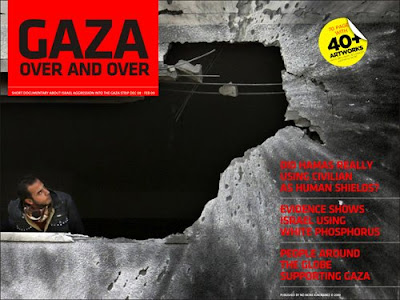
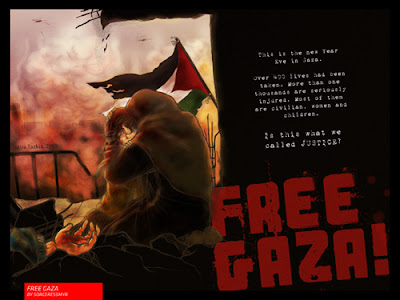
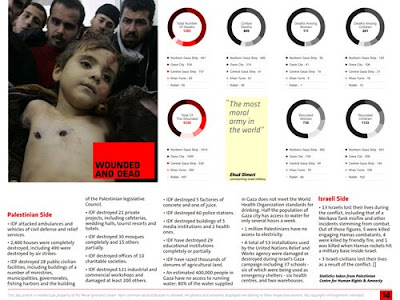

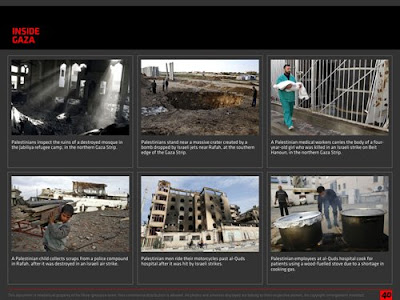

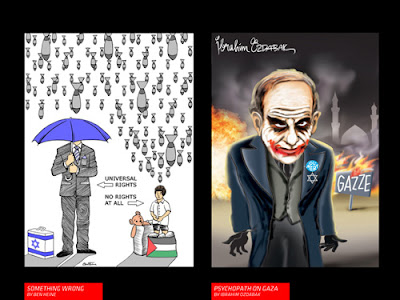
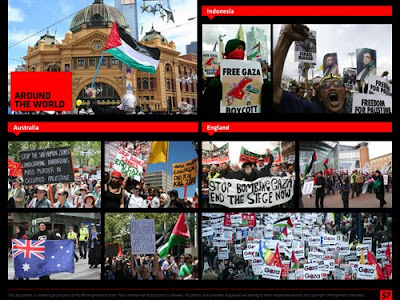
Monday, May 25, 2009
Tuesday, May 12, 2009
A story of 13 years girls named Almasa
During the last war on Gaza, all of the family memebers of this little girlwere killed by the Israeli forces. It is in Arabic and i will try to add subtitles in English soon.
Tuesday, March 31, 2009
Gaza war crime claims gather pace as more troops speak out
Full story @ The Guardian
Wednesday, March 25, 2009
Gaza war crimes investigation
- Civilians, medics and investigators talk to the Guardian about allegations of war crimes during Israel's 23-day campaign in Gaza
- Israeli unmanned aerial vehicles – drones – caused at least 48 deaths in Gaza during the 23-day offensive
- Three teenage boys say they were made to kneel in front of tanks to deter Hamas attacks
- Israeli military says medical staff 'take the risk upon themselves'
